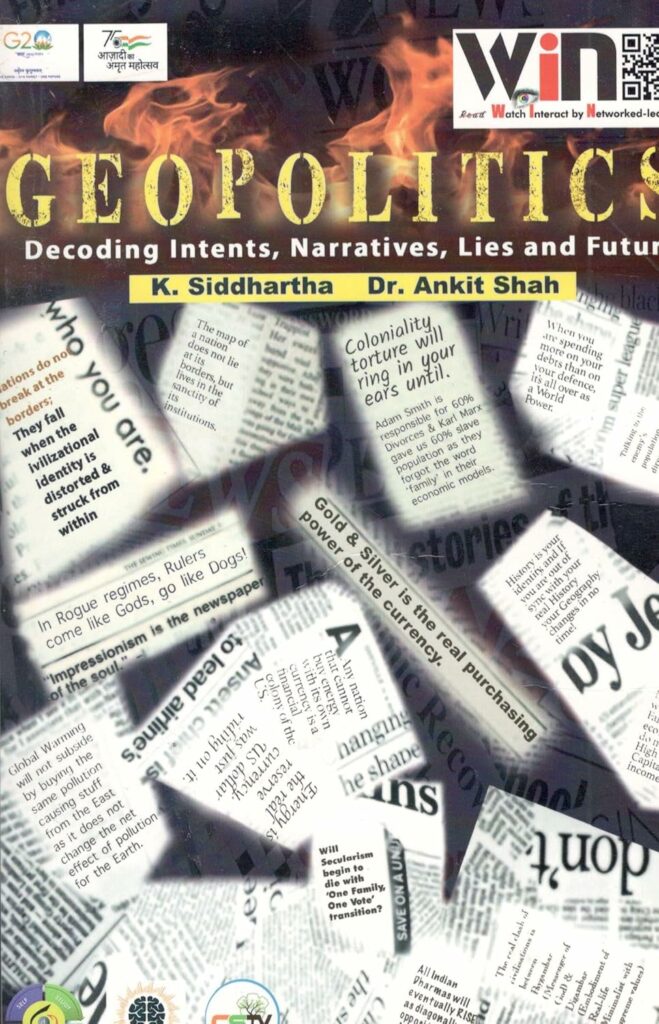Geopolitics – Decoding Narratives, Lies, Intents & Purposes is not a book to be read casually. It is a confrontation, an invitation to look in the mirror and ask yourself: ‘Whose thoughts am I thinking of?’

While today’s world is guided by both organisations and narratives, the book Geopolitics: Decoding Intents, Narratives, Lies and Future by K. Siddhartha and Dr. Ankit Shah examines what drives global politics. Basically, the book proclaims a break from accepted political and social beliefs. It fearlessly questions the basis of Western philosophy, points out that objectivity does not exist in modern systems and encourages a revival of the Indian perspective.
From its first line: “Truly, the world is not a liveable place for all those discerning people who understand what is happening…”, the tone is set. This book is for those who dare to question the dominant narratives. The book doesn’t aim to offer “balanced” perspectives in the typical liberal academic sense. Instead, it tries to address what it thinks is a distorted world conversation with Western ideologies, Islamic expansionism, and media-based misinformation. Through changing the way history is taught, cultural deconstruction, and strategic evaluation, the author looks at how geopolitics really works, not how it is claimed to be.
One of the central quotes that resonates early on is: “Can you imagine a situation where people who are cheated, robbed, looted, manipulated, humiliated, beaten, and destroyed, the very same people, worship their robbers, cheaters, and haters, eulogise them, imitate them, and elevate them?”
Geopolitics for Control and Narrative Warfare
The book frames geopolitics as a multi-dimensional war, using factors such as the media, educational systems, style and family planning. According to the author, present-day wars exist both at national borders and within our screens, thoughts, schools and homes.
The book introduces the idea that geopolitical tools today include economic sanctions, shifting religious messages, cultural weakening and spreading misinformation are all considered geopolitical tools today.
Colonialism is not viewed merely as an economic or territorial expansion but as a permanent mental occupation. It is thought that Indians nowadays live with a strange identity that respects their former colonisers and mocks their own culture.
Tone, Style, and Literary Method
The author uses a conversational yet polemical tone, blending personal anecdote, historical analysis, and cultural critique. Rather than applying neutral language, this book is open and direct and does not hide behind neutral phrases.
The book is a visually engaging and intellectually provocative read. It doesn’t rely only on dense texts but also on memes, symbolic images and powerfully evocative photos, besides writing a lot of text, to grab the reader’s interest. They are not meant only for decoration; they make understanding complicated geopolitical stories much easier.
The Narrative of Identity Wars
One of the most impassioned chapters is “Identity Wars,” where the authors expose and criticise the internalised feelings of inferiority that many post-colonial societies still hold, particularly in India. It reads as both an indictment and a plea: “Our toddlers still learn ‘Baa baa black sheep,’ even though there are no sheep in tropical regions of India.”
This is not just making fun of nursery rhymes, it’s like an illustration of the deep disconnect between indigenous identity and imposed education systems. The book mentions that modern friend of the youth, “screen addiction” (like phone or TV overuse) is used to watch people and control their thinking.
The recurring call throughout the book is for a psychological and ideological decolonisation of India.

The Indian Context: A Spiritual Battleground
Throughout the book, you can feel that the author sees India, referred to as Bharat, as the final major challenge to Abrahamic and Western expansionism. There’s a deep frustration with India’s constitution and educational institutions, because they are believed to follow ideas from British colonial times (colonial mindset).
This chapter on “Soft Power Colonisation” stands as one of the most potent in the book. It is shown that cultural and economic soft power are enough to weaken and conquer whole civilisations without firing a single bullet. The core of this argument lies in the author’s question: “Can you imagine a situation where you start mocking your looks, your colour, your own body, your own culture, and language, and take pride in this mockery?”
There’s a special emphasis given to learning how a language is formed and used. Socially, boosting Hinglish and Urdu at the cost of Sanskritised or pure Hindi is seen as a trend designed to kill native pride.
The Myth of Currency Supremacy
The chapter “The Dollar of War” presents a metaphorical yet scathing narrative around how the U.S. has built a monopoly on international finance through artificial demand for the dollar. While this seems simple on the surface, it delivers a profound geopolitical insight: that control over currency is control over trade, and therefore, over sovereignty. The author accuses America of building its soft power on an economic lie — a paper promise upheld by forced consensus and fear of exclusion.
He refers to the American Dream as a marketing concept funded by control over global currency flows. The U.S.’s use of sanctions, such as in Iran, Cuba, or Russia, is seen as currency weaponisation masquerading as diplomacy.
‘Water Wars’, China’s Hydro-Hegemony and Rare Earth
One of the most sobering sections of the book is the analysis of China’s strategic use of river systems originating in Tibet. The Brahmaputra, Salween, Indus, and Mekong rivers are lifelines for billions in India, Bangladesh, Vietnam, and Myanmar.
“China can cause floods, famines, and man-made calamities in the region.”
One of the more technical but under-discussed sections deals with rare earth elements (REEs) — materials critical to modern electronics, from smartphones and EVs to defence systems. China’s domination over global REE supply chains is presented as a silent geopolitical time bomb.
This is framed as the new oil — the next battleground — where control over supply chains will determine tech dominance. The authors warn that India must take REEs seriously as a strategic priority, not just a mining opportunity.
“The Good Old Gold” and Demonetisation as a Global Trigger
This chapter includes one of the controversial subtopics that contends that India’s 2016 demonetisation was not just a domestic anti-corruption step, but as the beginning of a global currency reset. The claim is that India took the first real step toward de-dollarisation by introducing a gold monetisation scheme and encouraging local-currency trade with partners like Russia and Iran.
Strategic Takeaways for India & the Global South
The authors believe that India is not just a country but a memory-keeper of a much older, deeper way of life. The recurring call throughout the book is for a psychological and ideological decolonisation of India. According to the authors, true freedom begins when Indians stop celebrating the symbols, systems, and languages of their colonisers.
The book is not only concerned with presenting ideals. It provides interesting and sometimes questioned, strategic advice — mainly helpful for countries like India, Bangladesh, Vietnam and several African nations where identity is still blurred after colonialism.
The book encourages both India and the Global South to maintain their cultural roots, secure their currencies, tackle future information warfare and save their ancient traditions.
A Book That Demands Intellectual Involvement
Geopolitics – Decoding Narratives, Lies, Intents & Purposes is not a book to be read casually. It is a confrontation, an invitation to look in the mirror and ask yourself: “Whose thoughts am I thinking of?” It blends history, strategy, psychology, and identity into a cohesive geopolitical manifesto. Its central belief is that mental colonisation is more damaging than physical, and that true freedom comes only when a civilisation rewrites its own story.
The book will be treasured by those who sense that something is deeply wrong in the world order and want to do something about it, and may not be appreciated by those who prefer comfort over truth.
Book: Geopolitics: Decoding Intents, Narratives, Lies and Future
Authors: K. Siddhartha, Dr. Ankit Shah
Publishers: Kitab Mahal
Price: ₹595 (Paperback)
SW Ratings: ****
